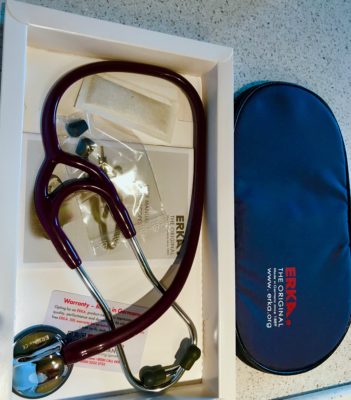We have scribes at our hospital ED, and they’re not just amazingly bright young people who help us with charting, they’re amazingly bright young people who bring various other talents with them.
A talent that’s often useful is the Spanish language here in Texas. Often, we’re pressed for time, and a scribe with any Spanish-language talent is a sought-after commodity.
One of my colleagues relates that once he asked a new scribe if they spoke any Spanish.
The answer? “I speak conversational Spanish”. (Doc is pleased).
So, off to the patient’s room. Scribe gets through basic introductions okay.
“Is she having any vaginal discharge?” is the question, aimed at the scribe for relay to the patient.
Loooong pause.
“That’s not really conversational Spanish”, says a scribe now completely beyond their ability.
All’s well that ends well, but now we all have an appreciation for how medical and conversational language differ.



I couldn’t help but laugh at this one. When I was still living in Houston, I signed up to volunteer at Ben Taub Hospital. (Ben Taub, being the largest county hospital, is full of probably the worst of what the city has to offer; just think big-city, urban crime/drugs, no money, and you’ve got it). Translating services were good volunteer gigs because they got to see ALL of the hospital, since they’re needed everywhere.
They made me take a Spanish test with some medical terminology (but not completely) and I didn’t make their cutoff! I was upset; I was a volunteer and they were denying my help! But I was made to understand that the “exactness” of the dialogue is just as critical it would be for anyone speaking to their physician; no slack should be made just because of language barriers.
Instead, I helped out in the ER waiting area to assist “conversational” situations, such as where a family member was, etc. I’m sure I’d easily pass the test now, but I had almost forgotten about that test (not the volunteer experience) until this post.
A good translator is a must. It can be very difficult to use a relative. I will never forget when one of my patients came for follow-up after pituitary surgery. I was trying to ask questions pertaining to how certain organs were functioning after most of the pituitary was removed. He’d brought his grandson as translator & the boy had to be about 12. I just gave up on the sexual history until a subsequent visit, when the wife could translate. And that was not ideal either.
Does it frustrate anyone else that this is the United States and that people should speak English? Why should the burden be placed upon the healthcare provider and not on the individual?
Does it frustrate anyone else? You bet! I myself am not a native English speaker but I learned it because I had to (and I wanted to). My older relatives struggle with English a lot more than I did but they are doing it. They have no choice because our language is not Spanish and no one is going to provide interpreters for us.
I know what it’s like to learn a foreign language. It is inexcusable that after 5 or 10 years in this country people don’t know enough English to describe their chief complaint. No, you don’t need to know medical terminology and you don’t need to know a lot of grammar either. A small pocket dictionary would have the words “vagina” and “discharge” in it. Open the dictionary on those pages and stick your finger at the words and you will be understood. I would like to see Spanish-speaking patients making these attempts first before bringing in interpreters required to know medical terminology in Spanish.
For that matter, why should the burden of medical care be on the provider and not on the individual? This is the age of the Internet, for heaven’s sake. A little Googling, a first-aid kit and an online account with a Mexican or Canadian pharmacy ought to be enough for anyone to diagnose and treat their own illnesses, splint their own broken bones or patch up their own wounds. (You can print out diagrams and instructions if you should need surgical assistance from a family member or neighbor.) I’ve also made it a point to learn the language of every foreign country I’ve ever traveled in (actually, this is more or less true, but I may be untypical). Failure to do so just sets you up for problems if, God forbid, you can’t find a convenient Internet cafe.